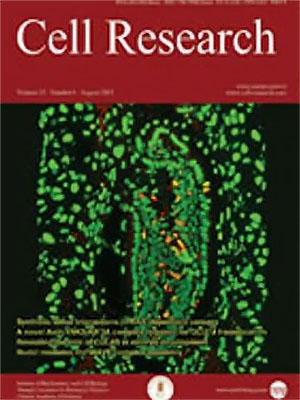
Volume 14, No 1, Feb 2004
ISSN: 1001-0602
EISSN: 1748-7838 2018
impact factor 17.848*
(Clarivate Analytics, 2019)
Volume 14 Issue 1, February 2004: 46-53
ORIGINAL ARTICLES
Expression of MRP14 gene is frequently down-regulated in Chinese human esophageal cancer
Jie WANG1*, Yan CAI1*, Hao XU1, Jun ZHAO2, Xin XU1, Ya Ling HAN1, Zhi Xiong XU1, Bao Sheng CHEN1, Hai Hu1, Min WU1, Ming Rong WANG1
1National Laboratory of Molecular Oncology, Cancer Institute (Hospital), Chinese Academy of Medical Sciences, Peking University of Medical School, Beijing 100021, China.
2Department of Thoracic Surgery, Cancer Institute (Hospital), Chinese Academy of Medical Sciences, Peking University of Medical School, Beijing 100021, China.
Correspondence: Ming Rong WANG(wangmr@263.net.cn)
Migration inhibitory factor-related protein 14 (MRP14) is one of calcium-binding proteins, referred as S100A9. The heterodimeric molecule formed by MRP14 with its partner MRP8 (S100A8) is the major fatty acid carrier in neutrophils. The MRP8/14 complex has been also implicated in the intracellular transport of arachidonic acid and its precursors in keratinocytes. We show here the involvement of MRP14 in human esophageal cancer. In an initial study, mRNA differential display - reverse transcription polymerase chain reaction (DD-PCR) was performed with two esophageal carcinomas, one esophageal adenocarcinoma and matched normal adjacent mucosa. DD-PCR with the arbitrary primer OPA3 showed that one cDNA band was highly expressed in normal tissues, but disappeared or substantially decreased in tumor counterparts. It was later identified to be the 3'-end of migration inhibitory factor-related protein 14 (MRP14). Northern blotting, RT-PCR and Western blotting corroborated the down-regulation of MRP14 in 58/64 squamous cell carcinomas and 2/2 adenocarcinomas as compared with adjacent normal epithelia of the esophagus. MRP14 was undetectable in 3/3 esophageal-carcinoma cell lines. Immunochemistry demonstrated that expression of MRP14 was restricted to normal esophageal epithelia. No mutation was found in the genomic DNA of the MRP14 gene by PCR and directed DNA sequencing. Our finding suggested that the reduction of MRP14 expression is a frequent event in Chinese human esophageal cancer.
FULL TEXT | PDF
Browse 1966


